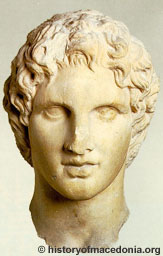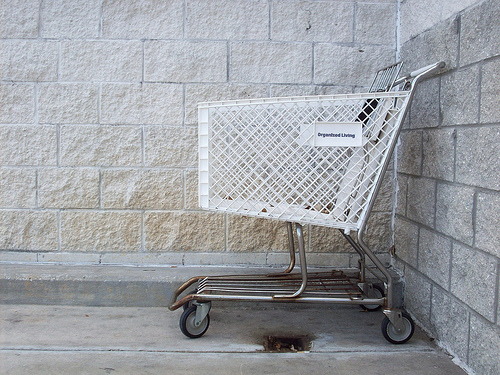 Alexander
III the Great, the King of Macedonia and conqueror of the Persian Empire
is considered one of the greatest military geniuses of all times. He
was inspiration for later conquerors such as Hannibal the
Carthaginian, the Romans Pompey and Caesar, and Napoleon. Alexander was born in 356 BC in Pella, the ancient
capital of Macedonia. He was son of Philip
II, King of Macedonia, and Olympias, the princess of
neighboring Epirus. He spent his childhood watching his father
transforming Macedonia into a great military power, winning victory
after victory on the battlefields throughout the Balkans. When
he was 13, Philip hired the Greek philosopher Aristotle to be
Alexander’s personal tutor. During the next three years
Aristotle gave Alexander a training in rhetoric and literature and
stimulated his interest in science, medicine, and philosophy, all of
which became of importance in Alexander’s later life. In 340,
when Philip assembled a large Macedonian army and invaded Thrace, he
left
his 16 years old son with the power to rule Macedonia in his absence
as regent, which shows that even at such young age Alexander was
recognized as quite capable. But as the Macedonian army
advanced deep into Thrace, the Thracian tribe of Maedi bordering
north-eastern Macedonia rebelled and posed a danger to the
country. Alexander assembled an army, led it against the
rebels, and with swift action defeated the Maedi, captured their
stronghold, and renamed it after himself to Alexandropolis.
Alexander
III the Great, the King of Macedonia and conqueror of the Persian Empire
is considered one of the greatest military geniuses of all times. He
was inspiration for later conquerors such as Hannibal the
Carthaginian, the Romans Pompey and Caesar, and Napoleon. Alexander was born in 356 BC in Pella, the ancient
capital of Macedonia. He was son of Philip
II, King of Macedonia, and Olympias, the princess of
neighboring Epirus. He spent his childhood watching his father
transforming Macedonia into a great military power, winning victory
after victory on the battlefields throughout the Balkans. When
he was 13, Philip hired the Greek philosopher Aristotle to be
Alexander’s personal tutor. During the next three years
Aristotle gave Alexander a training in rhetoric and literature and
stimulated his interest in science, medicine, and philosophy, all of
which became of importance in Alexander’s later life. In 340,
when Philip assembled a large Macedonian army and invaded Thrace, he
left
his 16 years old son with the power to rule Macedonia in his absence
as regent, which shows that even at such young age Alexander was
recognized as quite capable. But as the Macedonian army
advanced deep into Thrace, the Thracian tribe of Maedi bordering
north-eastern Macedonia rebelled and posed a danger to the
country. Alexander assembled an army, led it against the
rebels, and with swift action defeated the Maedi, captured their
stronghold, and renamed it after himself to Alexandropolis.
Two years
later in 338 BC, Philip gave his son a commanding post among the
senior generals as the Macedonian army invaded Greece. At the Battle
of Chaeronea the Greeks were defeated and Alexander displayed his
bravery by destroying the elite Greek force, the Theban Secret Band.
Some ancient historians recorded that the Macedonians won the battle
thanks to his bravery.
The Family Split and the Assassination
of Philip II
 But not too long after the defeat
of the Greeks at Chaeronea, the royal family split apart when Philip
married Cleopatra, a Macedonian girl of high nobility. At the wedding
banquet, Cleopatra's uncle, general Attalus, made a remark about
Philip fathering a ‘legitimate’ heir, i.e., one that was of pure
Macedonian blood. Alexander threw his cup at the man, blasting him
for calling him 'bastard child’. Philip stood up, drew his sward,
and charged at Alexander, only to trip and fall on his face in his
drunken stupor at which Alexander shouted:
But not too long after the defeat
of the Greeks at Chaeronea, the royal family split apart when Philip
married Cleopatra, a Macedonian girl of high nobility. At the wedding
banquet, Cleopatra's uncle, general Attalus, made a remark about
Philip fathering a ‘legitimate’ heir, i.e., one that was of pure
Macedonian blood. Alexander threw his cup at the man, blasting him
for calling him 'bastard child’. Philip stood up, drew his sward,
and charged at Alexander, only to trip and fall on his face in his
drunken stupor at which Alexander shouted:
"Here is the man who was making
ready to cross from Europe to Asia, and who cannot even cross from
one table to another without losing his balance."
 He
then took his mother and fled the country to Epirus. Although allowed
to return later, Alexander remained isolated and insecure at the
Macedonian court. In the spring of 336 BC, with Philip’s Persian
invasion already set in motion, the king was assassinated by a young
Macedonian noble Pausanias, during the wedding ceremony in Aegae,
the old capital
of Macedonia. Why Pausanias killed the Macedonian king is
a question that puzzled both ancient and modern historians. There
is a claim that Pausanias was driven into committing the murder
because he was denied justice by the king when he sought his support
in punishing the Cleopatra's uncle Attalus for earlier mistreatment.
But there are also reports that that both Olympias and Alexander
were responsible for the assassination, by driving the young men
into committing the act. That might explain why Pausanias was instantly
put to death by Alexander's close friends as he attempted to flee
the scene, instead of being captured alive and tried before the Macedonian
assembly. Philip, the
great Macedonian conqueror was dead, the men who liberated his own
country and brought if from the edge of the abyss into a world power.
His dream of conquering the Persian Empire now lays on his successor,
his son king Alexander III.
He
then took his mother and fled the country to Epirus. Although allowed
to return later, Alexander remained isolated and insecure at the
Macedonian court. In the spring of 336 BC, with Philip’s Persian
invasion already set in motion, the king was assassinated by a young
Macedonian noble Pausanias, during the wedding ceremony in Aegae,
the old capital
of Macedonia. Why Pausanias killed the Macedonian king is
a question that puzzled both ancient and modern historians. There
is a claim that Pausanias was driven into committing the murder
because he was denied justice by the king when he sought his support
in punishing the Cleopatra's uncle Attalus for earlier mistreatment.
But there are also reports that that both Olympias and Alexander
were responsible for the assassination, by driving the young men
into committing the act. That might explain why Pausanias was instantly
put to death by Alexander's close friends as he attempted to flee
the scene, instead of being captured alive and tried before the Macedonian
assembly. Philip, the
great Macedonian conqueror was dead, the men who liberated his own
country and brought if from the edge of the abyss into a world power.
His dream of conquering the Persian Empire now lays on his successor,
his son king Alexander III.
Suppression of the Thracian, Illyrian, and Greek Rebellions
Once he ascended on the Macedonian throne, Alexander
quickly disposed of all of his domestic enemies by ordering their
execution. But soon he had to act outside Macedonia.
Philip’s death caused series of rebellions among the conquered
nations and the Illyrians, Thracians, and Greeks saw a chance for
independence. Alexander acted swiftly. He forced his way
into Greece despite the roads leading to the country being blocked
by the Thessalians. As soon as he restored Macedonian rule in
northern Greece, he marched into southern Greece. His speed
surprised the Greeks and by the end of the summer 336 BC they had no
other choice but to acknowledge his authority.
 Believing
the Greece would remain calm, Alexander returned to Macedonian,
marched east into Thrace, and campaigned as far as the Danube
river. He defeated the Thracians and Tribalians in series of
battles and drove the rebels beyond the river. Then he marched back
across Macedonia and on his return crushed in a single week the
threatening Illyrians, before they could receive additional
reinforcements.
Believing
the Greece would remain calm, Alexander returned to Macedonian,
marched east into Thrace, and campaigned as far as the Danube
river. He defeated the Thracians and Tribalians in series of
battles and drove the rebels beyond the river. Then he marched back
across Macedonia and on his return crushed in a single week the
threatening Illyrians, before they could receive additional
reinforcements.
But now in Greece, upon rumors of his death, a major
revolt broke out that engulfed the whole nation. Enraged,
Alexander marched south covering 240 miles in two weeks appearing
before the walls of Thebes with large Macedonian army. He let
the Greeks know that it was not too late for them to change their
minds, but the Thebans confident in their position called for all
the Greeks who wished to set Greece free to join them against the
Macedonians. They were not aware that the Athenians and the Peloponnesians,
stunned by the speed of the Macedonian king, quickly reconsidered
their options and were now awaiting the outcome of the battle before
they make their next move.
Alexander's general Perdiccas
attacked the gates, broke into the city, and Alexander moved with
the rest of the army behind him to prevent the Thebans from cutting
him off. The Macedonians stormed the city, killing everyone in
sight, women and children included. 6,000 Thebans citizens
died and 30,000 more were sold as slaves. The city where Alexander's
father was kept as hostage for three years, was plundered, sacked,
burned, and razed to the ground, just like Philip acted with Methone,
Olynthus, and the rest of the Greek cities in Chalcidice. Only
the temples and the house of the poet Pindar were spared from
distraction. This was example to the rest of Greece and Athens and
the other Greek city-states quickly rethought their quest for
freedom. Greece remained under Macedonian rule.
The Battle of Granicus
With
the conquered territories firmly in Macedonian control, Alexander
completed the final preparations for the invasion of Asia. The
22 year-old king appointed Philip's experienced general
Antipater as regent in his absence to preside over the affairs
of Macedonia and Greece, left him a significant force of 13,500
Macedonian soldiers to watch Greece, Thrace, Illyria, and protect
Macedonia, and set out for the Hellespont (modern Dardanelles) in
the spring of 334 BC.

As
his ship approached the Asia Minor's coast, he threw his spear from
abroad and stuck it in the ground. He stepped onto the shore, pulled
the weapon from the soil, and declared that the whole of Asia would
be won by the Macedonian spear.

In
the army there were 25,000 Macedonians, 7,600 Greeks, and 7,000
Thracians and Illyrians, but the chief officers were all Macedonians,
and Macedonians also commanded the foreign troops. Alexander's
second in command was Philip's general Parmenio, the other important
commanders being Perdiccas, Craterus, Coenus, Meleager,
Antigonus,
and Parmenio's son Philotas. The army soon encountered the forces
of King Darius III. There were 40,000 Persians and Greeks (20,000
each) waiting for them at the crossing of the river Granicus, near
the ancient city of Troy. These Greeks had joined the Persians
in the years following the defeat of the Greek army by Philip II
at Chaeronea. It is important to note the number of Greeks on the
both sides. The Greeks in the Macedonian train were mobilized by
the Macedonians, and historians Peter Green
and Ulrich
Wilcken speak of them as hostages that would ensure the
good behavior of their countrymen left behind in Greece under the
watch of Antipater's Macedonian garrisons. Not surprisingly, the
Greeks in Alexander's army played insignificant role in the upcoming
battles, only to be discharged when convenient. But far greater
number of Greeks joined the Persians brushing away the memory of
the Persian invasion of Greece some 150 years ago. The ancient Greek
historian
Arrian
cited the "old racial rivalry between the Greeks
and Macedonians" that led to this hatred on both sides.
The
Macedonians defeated the Persians and put them to flight and although
the Greeks held their ground and fiercely fought, the battle ended
in Macedonian victory. Almost the entire Greek force was annihilated.
18,000 Greeks perished on the banks of Granicus and the 2,000 survivors
were sent to forced labor in Macedonia. The Macedonians lost only
120 men according to tradition.
The Campaigns in Asia Minor
Alexander
then led the army south across Asia Minor. Ironically, it is not
the Persians but the Greek coastal cities which gave the greatest
resistance to the Macedonians. The Greek commander Memnon and his
men considerably slow down the advance of Alexander and many Macedonians
died during the long and difficult sieges of the Greek cities of
Halicarnassus, Miletus, Mylasa. But at the end the Macedonian army
defeated the enemy and conquered the coast of Asia Minor. Alexander
then turned northward to central Asia Minor, to the city of Gordium.


Gordium
was a home of the famous so-called Gordian Knot. Alexander knew
the legend that said that the man who could untie the ancient knot
was destined to rule the entire world. To that date nobody had succeeded
in raveling the knot. But the young Macedonian king simply slashed
it with his sword and unraveling its ends.
The Battle of Issus
 In
the autumn of 333 BC, the Macedonian army's encountered the Persian
forces under the command of King Darius III himself at a mountain
pass at Issus in northwestern Syria. 30,000 Greeks again formed
a sizable addition to the Darius' army as elite fighters and were
positioned directly against the Macedonian phalanx. Describing the
atmosphere before a battle, the Roman historian Curtius explained
how Alexander raised the morale of the Macedonians, Greeks, Illyrians,
and Thracians in his army, one at the time:
In
the autumn of 333 BC, the Macedonian army's encountered the Persian
forces under the command of King Darius III himself at a mountain
pass at Issus in northwestern Syria. 30,000 Greeks again formed
a sizable addition to the Darius' army as elite fighters and were
positioned directly against the Macedonian phalanx. Describing the
atmosphere before a battle, the Roman historian Curtius explained
how Alexander raised the morale of the Macedonians, Greeks, Illyrians,
and Thracians in his army, one at the time:
"Riding to the front line he (Alexander the Great) named the soldiers
and they responded from spot to spot where they were lined up. The
Macedonians, who had won so many battles in Europe and set off to
invade Asia ... got encouragement from him - he reminded them of
their permanent values. They were the world's liberators and one
day they would pass the frontiers set by Hercules and Father Liber.
They would subdue all races on Earth. Bactria and India would become
Macedonian provinces. Getting closer to the Greeks, he reminded
them that those were the people (the Persians on the other side)
who provoked war with Greece, ... those were the people that burned
their temples and cities ... As the Illyrians and Thracians lived
mainly from plunder, he told them to look at the enemy line glittering
in gold ..."
(Q. Curtius Rufus 3.10.4-10)

Darius's
army greatly outnumbered the Macedonians, but the Battle of Issus
ended in a big victory for Alexander. Ten's of thousands of Persians,
Greeks, and other Asiatic soldiers were killed and king Darius fled
in panic before the Macedonian phalanx, abandoning his mother, wife,
and children behind. Alexander treated them with the respect out
of consideration for their royalty.
The Sieges of Tyre and Gaza
The
victory at Issus opened the road for Syria and Phoenicia. In early
332, Alexander sent general Parmenio to occupy the Syrian cities
and himself marched down the Phoenician coast where he received
the surrender of all major cities except the island city of Tyre
which refused to grant him access to sacrifice at the temple of
the native Phoenician god Melcart. A very difficult seven-month
siege of the city followed. In an enormous effort, the Macedonians
begun building a mole that would connect the island-city with the
coast. Tons of rocks and wood were poured into the water strip
separating the island from the coast but its construction and the
attacks from the city walls cost Alexander many of his bravest Macedonians.
Although seriously tempted to lift the siege and continue marching
on Egypt, Alexander did not abandon the project and continued the
siege, surrounding the island with ships and blasting the city walls
with catapults. When the walls finally gave in, the Macedonians
poured their anger over the city defenders - 7,000 people were killed,
30,000 were sold as slaves. Alexander entered the
temple of Melcart, and had his sacrifice.
During
the seven-month siege of Tyre, Alexander received a letter from
Darius offering a truce with a gift of several western provinces
of the Persian Empire, but he refused to make peace unless he could
have the whole empire. He continued marching south toward Egypt
but was again held up by resistance at Gaza. The Macedonians put
the city under a siege which lasted two months, after which the
scenario of Tyre was repeated. With the fall of Gaza, the whole
Eastern Mediterranean coast was now secured and firmly in the hands
of the Macedonians.
The
mainland Greeks had hoped that the Persian navy and the Greek commander
Memnon would land in Greece and help them launch a rebellion against
Antipater's Macedonians, transfer the war into Macedonia itself,
and cut off Alexander in Asia, but the sealing of the coast prevented
this from happening. Memnon fell sick and died while attempting
to regain the lost Greek city of Miletus on the Asia Minor coast,
and the Persian plan to transfer the war into Europe well apart.
Alexander in Egypt
 Alexander entered Egypt in the beginning
of 331 BC. The Persian satrap surrendered and the Macedonians were
welcomed by the Egyptians as liberators for they had despised living
under Persian rule for almost two centuries. Here Alexander ordered
that a city be designed and founded in his name at the mouth of
river Nile, as trading and military Macedonian outpost, the first
of many to come. He never lived to see it built, but Alexandria
will become a major economic and cultural center in the Mediterranean
world not only during the Macedonian rule in Egypt but centuries
after.
Alexander entered Egypt in the beginning
of 331 BC. The Persian satrap surrendered and the Macedonians were
welcomed by the Egyptians as liberators for they had despised living
under Persian rule for almost two centuries. Here Alexander ordered
that a city be designed and founded in his name at the mouth of
river Nile, as trading and military Macedonian outpost, the first
of many to come. He never lived to see it built, but Alexandria
will become a major economic and cultural center in the Mediterranean
world not only during the Macedonian rule in Egypt but centuries
after.
In
the spring of 331 Alexander made a pilgrimage to the great temple
and oracle of Amon-Ra, the Egyptian god of the sun, whom the Greeks
and Macedonians identified with Zeus Ammon. The earlier Egyptian
pharaohs were believed to be sons of Amon-Ra and Alexander as new
ruler of Egypt wanted the god to acknowledge him as his son. He
decided to make the dangerous trip across the desert to visit the
oracle at the temple of the god. According to the legend, on the
way he was blessed with abundant rain, and guided across the desert
by ravens. At the temple, he was welcomed by the priests and spoke
to the oracle. The priest told him that he was a son of Zeus Ammon,
destined to rule the world, and this must have confirmed in him
his belief of divine origin. Alexander remained in Egypt until
the middle of 331, and then returned to Tyre before facing Darius.
The Battle of Gaugamela
At
Tyre, Alexander received reinforcements from Europe, reorganized
his forces, and started for Babylon. He conquered the lands between
rivers Tigris and Euphrates and found the Persian army at the plains
of Gaugamela, near modern Irbil in Iraq, which according to the
exaggerated accounts of antiquity was said to number a million men.
The Macedonians spotted the lights from the Persian campfires and
encouraged Alexander to lead his attack under cover of darkness.
But he refused to take advantage of the situation because he wanted
to defeat Darius in an equally matched battle so that the Persian
king would never again dare to raise an army against him.

The
two armies met on the battlefield the next morning, October 1, 331
BC. On the Persian side were numerous Asiatic nations - Bactrians,
Indians, Medians, Sogdians, even Albanians from the Caucasus, the
ancestors of the modern Albanians who many centuries later migrated
to Europe and are now northern neighbors to the modern Greeks and
western neighbors to the modern Macedonians. The survivors of the
50,000 Greeks which Darius had on his side at the beginning of the
war were also among the Persian ranks.

Suppression of the Greek Rebellion, Discharge of the Greeks,
and the Death of Darius
Meanwhile
in Greece, the Greeks under the leadership of Sparta rose to a rebellion
against the Macedonian occupation.
Antipater was in Thrace at the time
and the Greeks took the opportunity to push back the Macedonian
forces. But their initial victory did not last for long as Antipater
returned with a large army, defeated the rebels, and regained Greece.
5,300 Greeks, including the Spartan king Agis were killed, while
the Macedonians lost 3,500 men.
In
Asia, the news of the beginning of the Greek rebellion had Alexander
so deeply worried, that he immediately sent money to Antipater to
counter it. And when he learned that the Greeks were defeated,
he proclaimed the end of the "Hellenic Crusade" and discharged
all-Greek forces in his army. He no longer needed these hostages
and potential troublemakers.

Alexander
continued his pursuit of Darius for hundreds of miles from Persepolis.
When he finally caught up to him, he found the Persian king dead
in his coach. He was assassinated by Bessus, the satrap of Bactria
which now proclaimed himself "King of the Kings",
assuming the
title of the Persian kings. Alexander gave Darius a royal funeral
and set out for Bactria after his murderer.
The
Trial of Philotas and the Murder of Parmenio
To win the support of the Persian aristocracy Alexander appointed many Persians as provincial governors in his new empire. He adopted the Persian dress for ceremonies, gave orders for Persians to be enlisted in the army, and encouraged the Macedonians to marry Persian women.
To win the support of the Persian aristocracy Alexander appointed many Persians as provincial governors in his new empire. He adopted the Persian dress for ceremonies, gave orders for Persians to be enlisted in the army, and encouraged the Macedonians to marry Persian women.
But
the Macedonians were unhappy with Alexander's Orientalization for
they were proud of their Macedonian customs, culture, and language.
His increasingly Oriental behavior eventually led to conflict with
the Macedonian nobles and some Greeks in the train. In 330 BC series
of allegations were brought up against some of Alexander's officers
concerning a plot to murder him. Alexander tortured and executed
the accused leader of the conspiracy, Parmenio's son Philotas, the
commander of the cavalry. Several other officers were also executed
according to Macedonian law, in order to eliminate the alleged attempt
on Alexander's life. During the trial of Philotas Alexander raised
the question of the use of the ancient Macedonian language. He spoke:
"'The Macedonians are about to pass judgment upon you; I wish to know whether you will use their native tongue in addressing them.' Philotas replied: 'Besides the Macedonians there are many present who, I think, will more easily understand what I shall say if I use the same language which you have employed.' Than said the king: 'Do you not see how Philotas loathes even the language of his fatherland? For he alone disdains to learn it. But let him by all means speak in whatever way he desires, provided that you remember that he holds out customs in as much abhorrence as our language.'" (Quintus Curtius Rufus 6.9.34-36)
The
trial of Philotas took place in Asia before a multiethnic public,
which has accepted Greek as their common language. Alexander spoke
Macedonian with his conationals, but used Greek in addressing the
Greeks and the Asians, as Greek was widely taken as international
language in ancient times. Like Carthaginian, Illyrian, and Thracian, ancient Macedonian was not
recorded in writing. However, on the bases of about hundred glosses,
Macedonian words noted and explained by Greek writers, some place
names from Macedonia, and names of individuals, most scholars
believe that ancient Macedonian was a separate Indo-European language.
Evidence from phonology indicates that the ancient Macedonian language
was distinct from ancient Greek and closer to the Thracian and Illyrian
languages. Some modern writers have erroneously concluded that the
Macedonians spoke Greek based on few Greek inscriptions discovered
in Macedonia, but that is by no means a proof that the Macedonian
was not a distinct language. Greek inscriptions were also found
in Thrace and Illyria, the Thracians even inscribed their coins and vessels
in Greek, and we know that both the Illyrians and the Thracians
were not Greeks who had distinct languages.
After
Philotas was executed according to the Macedonian custom, Alexander
ordered next the execution of Philotas' father, general Parmenio.
But the death of the old general did not sit well with every Macedonian
in the army. Parmenio was a veteran, proven solder of Philip's
guard, a men who played a major part in leading the Macedonian armies
and rising the country to a world power. In fact Philip II had often
remarked how proud he was to have Parmenio as his general.
The Murder of Cleitus and the execution of Callisthenes
Alexander
next killed Cleitus, another Macedonian noble, in a drunken brawl.
Heavy drinking was a cherished tradition at the Macedonian court
and that day Cleitus publicly denounced the king before the present
for the murders of Parmenio and Philotas. He went further by ridiculing
Alexander for claiming to be "son of Ammon" and for denouncing
his own father Philip II. Alexander lost his temper, snatched the
spear from the bodyguard standing near, and ran Cleitus through
with it. Although he mourned his friend excessively and nearly committed
suicide when he realized what he had done, all of Alexander's associates
thereafter feared his paranoia and dangerous temper.
He
next demanded that Europeans, just like the Asians, follow the Oriental
etiquette of prostrating themselves before the king - which he knew
was regarded as an act of worship by the Greeks. But resistance
put by Macedonian officers and by the Greek historian Callisthenes,
the nephew of Aristotle who had joined the expedition, defeated
the attempt. Callisthenes was soon executed on a charge of conspiracy,
and we can only imagine how Aristotle received the news of his death.
The two were already estranged for a long time before Callisthenes’
execution, as Alexander's letters to his former tutor carried unfriendly
contents.
The
Macedonians spent two hard years in Bactria fighting a guerilla
war against the followers of Bessus and the Sogdian ruler Spitamenes.
Finally, Bessus was caught and executed for the murder of his king
Darius III, and Spitamenes was killed by his own wife which was
tired of running away. Bactria and Sogdiana, the most eastern provinces
of the Persian Empire came under Macedonian control. It is here
that Alexander fell in love with and married the beautiful Sogdian
princess Roxane.
The March on India
 In the spring of 327 BC, Alexander and his army marched into India
invading Punjab. The greatest of Alexander's battles in India was
at the river Hydaspes, against king Porus, one of the most powerful
Indian rulers. In the summer of 326 BC, Alexander's army crossed
the heavily defended river during a violent
thunderstorm to meet Porus' forces. The Indians were defeated in
a fierce battle, even though they fought with elephants, which the
Macedonians had never seen before. Porus was captured and like the
other local rulers he had defeated, Alexander allowed him to continue
to govern his territory.
In the spring of 327 BC, Alexander and his army marched into India
invading Punjab. The greatest of Alexander's battles in India was
at the river Hydaspes, against king Porus, one of the most powerful
Indian rulers. In the summer of 326 BC, Alexander's army crossed
the heavily defended river during a violent
thunderstorm to meet Porus' forces. The Indians were defeated in
a fierce battle, even though they fought with elephants, which the
Macedonians had never seen before. Porus was captured and like the
other local rulers he had defeated, Alexander allowed him to continue
to govern his territory.  In this battle
Alexander's horse Bucephalus was wounded and died. Alexander had
ridden Bucephalus into every one of his battles in Europe and Asia,
so when it died he was grief-stricken. He founded a city which
he named Buckephalia, in his horse's name.
In this battle
Alexander's horse Bucephalus was wounded and died. Alexander had
ridden Bucephalus into every one of his battles in Europe and Asia,
so when it died he was grief-stricken. He founded a city which
he named Buckephalia, in his horse's name.
The
army continued advancing as far as the river Hydaspes but at this
point the Macedonians refused to go farther as reports were coming
of far more larger and dangerous armies ahead equipped with many
elephants and chariots. General Coenus spoke on army's behalf to
the king. Reluctantly, Alexander agreed to stop here. Not too
long afterwards Coenus died and the army buried him with the highest
honors.
It
was agreed that the army travel down south the rivers Hydaspes and
Indus so that they might reach the Ocean on the southern edge of
the world and from there head westward toward Persia. 1,000 ships
were constructed and while the navy sailed the rivers, the army
rode down along the rivers banks, stopping to attack and subdue
the Indian villages along the way.

One
of the villages in which the army stopped belonged to the Malli,
who were said to be one of the most warlike of the Indian tribes.
Alexander was severally wounded in this attack when an arrow pierced
his breastplate and his ribcage. The Macedonians rescued him
in a narrow escape from the village. Still the Malli surrendered
as Alexander became to recover from the grave wound. The travel
down the river resumed and the Macedonian army reached the mouth
of the Indus in the summer of 325 BC. Then it turned westward to
Persia.

But
the return was a disaster. The army was marching through the notorious
Gerdosian desert during the middle of the summer. By the time Alexander
reached Susa thousands had died of heat and exhaustion.
Alexander's Death
In the spring of 324, Alexander
held a great victory celebration at Susa. He and 80 of his close
associates married Persian noblewomen. In addition, he legitimized
previous so-called marriages between soldiers and native women and
gave them rich wedding gifts, no doubt to encourage such unions.
 Little
later, at Opis he proclaimed the discharge of 10,000 Macedonian
veterans to be sent home to Macedonia with general
Craterus. Craterus' orders were to
replace Antipater and Antipater’s to bring new reinforcements in
Asia. But the army mutinied hearing this. Enraged Alexander pointed
the main ringleaders to his bodyguards to be punished and then gave
his famous speech where he reminded the Macedonians that without
him and his father Philip, they would have still been leaving in
fear of the nations surrounding Macedonia, instead of ruling
the world. After this the Macedonians were reconciled with their
king and 10,000 of them set out for Europe, leaving their children
of Asian women with Alexander. In the same time 30,000 Persian youth
already trained in Macedonian manner were recruited in the army.
Alexander prayed for unity between Macedonians and Persians and
by breeding a new army of mixed blood he hoped to create a core
of a new royal army which would be attached only to him.
Little
later, at Opis he proclaimed the discharge of 10,000 Macedonian
veterans to be sent home to Macedonia with general
Craterus. Craterus' orders were to
replace Antipater and Antipater’s to bring new reinforcements in
Asia. But the army mutinied hearing this. Enraged Alexander pointed
the main ringleaders to his bodyguards to be punished and then gave
his famous speech where he reminded the Macedonians that without
him and his father Philip, they would have still been leaving in
fear of the nations surrounding Macedonia, instead of ruling
the world. After this the Macedonians were reconciled with their
king and 10,000 of them set out for Europe, leaving their children
of Asian women with Alexander. In the same time 30,000 Persian youth
already trained in Macedonian manner were recruited in the army.
Alexander prayed for unity between Macedonians and Persians and
by breeding a new army of mixed blood he hoped to create a core
of a new royal army which would be attached only to him.
But
Alexander will never see this happen. Shortly before beginning
of the planned Arabian campaign, he contracted a high fever after
attending a private party at his friend's Medius of Larisa. As
soon as he drank from the cup he “shrieked aloud as if smitten by
a violent blow”. The fever became stronger with each following day
to the point that he was unable to move and speak. The Macedonians
were allowed to file past their leader for the last time before
he finally succumbed to the illness on June 7, 323 BC in the Macedonian
month of Daesius. Alexander the Great, the Macedonian king and the
great conqueror of Persian Empire, died at the age of 33 without
designating a successor to the Macedonian Empire.
After Alexander












